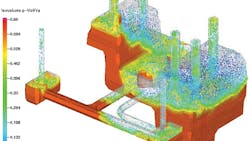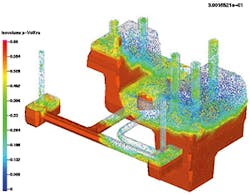Ensuring Maximum Performance at Start-Up
Today, “time to market” is one of the most critical challenges a foundry has to overcome to win over new customers while maintaining existing ones. Selecting the wrong cold-box binder system, coupled with the usually long and tedious process of troubleshooting new core boxes are things that can negatively impact the progress of bringing a production line to full production.
Therefore, to answer your question, as a full range global supplier of consumables to the foundry industry ASK Chemicals has a wide portfolio of solutions to your problem. Our extensive catalog of cold-box resin systems can be suitably matched to your sand and process for the highest quality cores. As the leader in cold-box technology, ASK Chemicals co-developed and markets Arena-flow simulation software, which accurately models the coremaking process to ensure that core box designs are optimized from the start, and helps foundries avoid the traditionally lengthy method of trial and error. Both options, together, are proven ways to save time and money in core-room operations.
To ensure binder performance, our tried and true formulations have been adopted globally and are supported by world-class chemists and laboratory facilities. We design our resin systems to withstand the most demanding foundry production processes and conditions. Our dedication to continuous research and development makes cutting-edge resin technology available for our customers’ needs: reduced emissions, low VOCs, high-strength properties, improved shakeout, and more.
Matching the right product to the right process is fundamental to the task of getting achieving best performance from the core room. Knowledge of the casting line requirements and details of the casting mix are critical to selecting the optimal resin for your needs. Our chemical families are developed to offer different attributes. ISOCURE™ is the industry standard phenolic urethane cold box system, and has a low cost per use. ECOURE™ has environmental benefits and features high strengths. ISOSET™ is well suited to high production processes due to its indefinite bench life and fast curing time. ISOMAX™ is a hybrid system with excellent dimensional stability and shakeout characteristics. Having the right resin is one vital element to the effort of maximizing core-room productivity at the lowest cost.
To help minimize time and frustration, and to maximize quality and productivity when starting up new core boxes, ASK Chemicals’ licensed Arena-flow software uses the revolutionary Computational Particle Fluid Dynamics (CPFD®) technology to model blowing and curing of sand cores. The software has been extensively tested and validated in core rooms across several continents, and has the high level of accuracy needed to link simulation results and core-box performance. Based on the true physics of sand and air-flow, Arena-flow has the ability to take into account critical, real-world information and generate meaningful data, such as:
• Sand particle size distribution (sieve/pan analysis), multiple sand types and additives;
• Core filling and miss filling, variation in density;
• “During process” information on sand and air speed;
• Magazine performance and the ability to predict rat-holes;
• Amine-based curing with varying pressure profiles.
Join the Conversation. Email Your Questions for ASK Chemicals
Share your insights, opinions, and elaborate on the questions and the experts' answer(s). You must be logged in to the website in order to post your comments.

